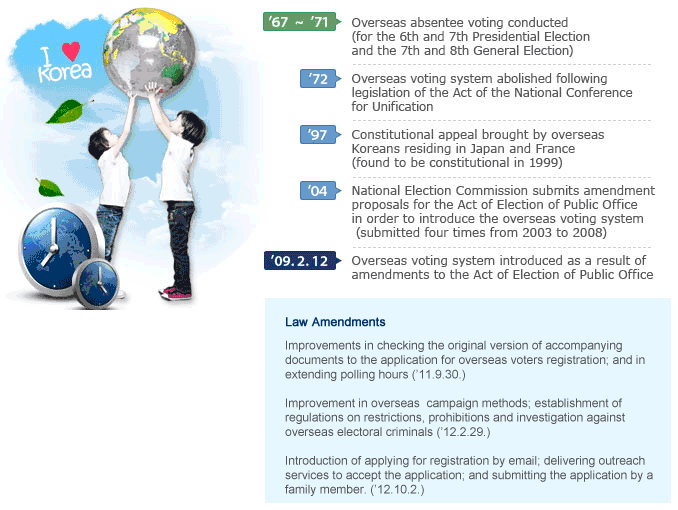Overseas Election System
Overseas Election System
가장 많이 본 정보
Introduction Background and Significance of Overseas Election
Introduction Background of the Overseas Election System

○ 24 Dec, 2015 & 15 Jan 2016: Elimination of the rule for attaching documents for reporting/registration for overseas voters, etc., introduction of a permanent list of overseas voters, permission to establish additional polling stations outside of diplomatic missions, and permission to set up additional polling stations for dispatched troops
○ 9 Mar, 2017: Regulations on non-implementation of overseas elections in the event of a presidential vacancy and expansion of the scope of the establishment of the Overseas Election Commission
○ 21 Jan, 2022: Mitigation of requirements for the reorganization of the list of overseas voters, establishment of grounds for adjusting voting hours at overseas polling stations, and mitigation of requirements for additional overseas voting centers
○ 29 Mar, 2023 & 31 July, 2023: Permission to report domestic return voting during the overseas voting period (’23.3.29.) and introduction of online reporting domestic return voting (’23.7.31.)
Significance of Introducing the Overseas Voting System
Realization of the people’s basic rights guaranteed by the Constitution
Voting rights is the most basic and essential right to realize the principle of popular soverignty and has a superior status over other basic rights, and restrictions on the right to vote should be kept to a minimum. Nevertheless, overseas Koreans have not been able to fully enjoy the rights they deserve as subjects of national sovereignty simply because they are outside the country.
However, on June 28, 2007, the Constitutional Court ruled that the provisions of the Public Official Election Act were unconstitutional due to violations of the voting and equal rights of overseas Koreans (overseas residents) and violation of the principle of universal suffrage. This event served as a milestone in that it became possible for Koreans risiding abroad to exercise their suffrage abroad.
Rise of Status as a Democratic Nation
The introduction of the overseas voting system is historically significant in that it serves as a tool that measures that the country has entered a politically advanced country and is the completion of our country's democracy.
According to the evaluation of The Economist, the British economic current affairs magazine, on the election process and election management, Korea is currently evaluated as one of the best in the world. The National Election Commission will successfully managed overseas elections by making full use of its experience in domestic election management.
Promoting the rights and interests of Koreans living aboad and inspiring pride and patriotism
With the introduction of the overseas voting system, overseas Koreans can exercise their right to vote, which means that their opinions will be reflected in national affairs. It also means more national policies for overseas Koreans will be introduced, which will further promote the rights and interests of overseas Koreans. In addition, by exercising your right to vote abroad, you will be able to feel patriotism and pride in being a citizen of the Republic of Korea no matter where you are in the world.
Active Response to the era of globalization
In the era of globalization, overseas elections will leave an important foundation for gathering the voices of overseas Koreans across the globe and developing national policies for them. Meanwhile, fair and clean overseas elections will enhance Korea’s national brand and establish a global Korean network, contributing to national harmony and development.
- next
- Types of Elections and Voting Eligibility
- previous
- No Data


















